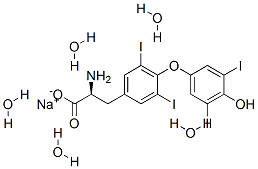6106-07-6
 6106-07-6 結(jié)構(gòu)式
6106-07-6 結(jié)構(gòu)式
基本信息
O-(4-羥基-3,5-二碘苯基)-3,5-二碘-L-酪氨酸單鈉鹽五水合物
左旋甲狀腺素鈉五水合物
3-[4-(4-HYDROXY-3,5-DIIODOPHENOXY)-3,5-DIIODOPHENYL]-L-ALANINE PENTAHYDRATE
3-[4-(4-HYDROXY-3,5-DIIODOPHENOXY)-3,5-DIIODOPHENYL]-L-ALANINE SODIUM SALT PENTAHYDRATE
L-THYROXINE SODIUM PENTAHYDRATE
L-THYROXINE SODIUM SALT PENTAHYDRATE
(S)-2-AMINO-3-[4-(4-HYDROXY-3,5-DIIODOPHENOXY)-3,5-DIIODOPHENYL]PROPIONIC ACID SODIUM SALT PENTAHYDRATE
SODIUM LEVOTHYROXINE PENTAHYDRATE
SODIUM (S)-2-AMINO-3-[4-(4-HYDROXY-3,5-DIIODOPHENOXY)-3,5-DIIODOPHENYL]PROPIONATE PENTAHYDRATE
3-(4-(4-hydroxy-3,5-diiodophenoxy)-3,5-diiodophenyl)-alaninmonosodiumsa
lt,pentahydrate,
l-tyrosine,o-(4-hydroxy-3,5-diiodophenyl)-3,5-diiodo-,sodiumsalt,pentahydra
o-(4-hydroxy-3,5-diiodophenyl)-3,5-diiodo-l-tyrosinesodiumsaltpentahydrate
L-thyroxine sodium pentahydrate*gamma-irradiated
sodium L-4-(4-hydroxy-3,5-diiodophenoxy)-3,5-diiodobenzylalaninate pentahydrate
L-THYROXINE, SODIUM SALT PENTAHYDRATE, 9 9%
L-THYROXINE SODIUM PENTAHYDRATE*GAMMA-IR RADIATED CE
L-Thyroxinesodiumsaltpentahydratecrystalline
3-[4-(4-hydroxy-3,5-diiodophenoxy)-3,5-diiodophenyl]-l-alanine sodium salt
O-(4-Hydroxy-3,5-diiodophenyl)-3,5-diiodo-L-tyrosine monosodium salt pentahydrate
SODIUM L-THYROXINE PENTAHYDRATE
物理化學(xué)性質(zhì)
安全數(shù)據(jù)
| 報(bào)價(jià)日期 | 產(chǎn)品編號(hào) | 產(chǎn)品名稱 | CAS號(hào) | 包裝 | 價(jià)格 |
| 2025/02/08 | HY-18341A | 左旋甲狀腺素鈉五水合物 L-Thyroxine sodium salt pentahydrate | 6106-07-6 | 500mg | 650元 |
| 2025/02/08 | HY-18341A | 左旋甲狀腺素鈉五水合物 L-Thyroxine sodium salt pentahydrate | 6106-07-6 | 10mM * 1mLin DMSO | 715元 |
| 2025/02/08 | HY-18341A | 左旋甲狀腺素鈉五水合物 L-Thyroxine sodium salt pentahydrate | 6106-07-6 | 1g | 850元 |
常見(jiàn)問(wèn)題列表
Thyroid Hormone Receptor
Deiodinases (DIOs), which catalyse the conversion of thyroxine (pro-hormone) to the active thyroid hormone, are associated with thyroid stimulating hormone (TSH) levels. DIO1 and DIO2 catalyze activation of thyroid hormone secretion in contrast to DIO3 playing role inactivation of the secretion. Activities of DIO1 and DIO2 play pivotal role in the negative feedback regulation of pituitary TSH secretion. L-Thyroxine (T4) and Triiodothyronine (T3) hormones are known to modulate the expression of ionic channels, pumps and regulatory contractile proteins. Moreover, thyroid hormones have been shown to influence calcium homeostasis and flux responsible for excitation and contractility, with L-Thyroxine and Triiodothyronine modulating its pharmacological control and secretion. In rats fed 12 weeks with the iodine-free diet, a significant decrease in the levels of both Triiodothyronine and L-Thyroxine is observed when compared to the control group fed with standard diet (p<0.001). In the group treated with low doses of L-Thyroxine, an increase in L-Thyroxine levels is observed (p=0.02) while Triiodothyronine levels remain virtually similar to the control group (p=0.19). Rats treated with high doses of L-Thyroxine display a significant increase in both Triiodothyronine and L-Thyroxine circulating concentrations compared to the non-treated hypothyroid group (p<0.001 and p=0.004, respectively) and a significant increase in L-Thyroxine levels when compared to the control values (p=0.03).
